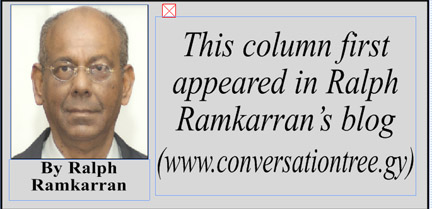Guyana is in virgin, unexplored, political territory. In various interviews both Opposition Leader David Granger and AFC Leader Khemraj Ramjattan, have indicated that the period of foreplay between their parties is over and consummation is in progress. The public awaits the end of the process to determine whether it has ended with an ecstatic bang or an unfulfilling whimper.
Upon past experience, a collaborative effort in Guyana’s politics requires certain sequential steps. The first and most important is to define the objective. The second is to agree on the programme. The third is to establish the leadership structure, one part of which will be the presidential candidate. The fourth is to decide how the seats will be apportioned, particularly if the alliance gets, together, more seats than the individual parties obtained in 2011. The selection of ministers should await the election results.
The circumstances for opposition alliances from the late 1960s to the beginning of the 1990s when the PPP was in opposition, are far different from the present. Ideology was a factor. Potential electoral competition between parties was another. Over-estimation of political support by one or the other party, in the absence of a legitimate method of testing electoral strength, was a

